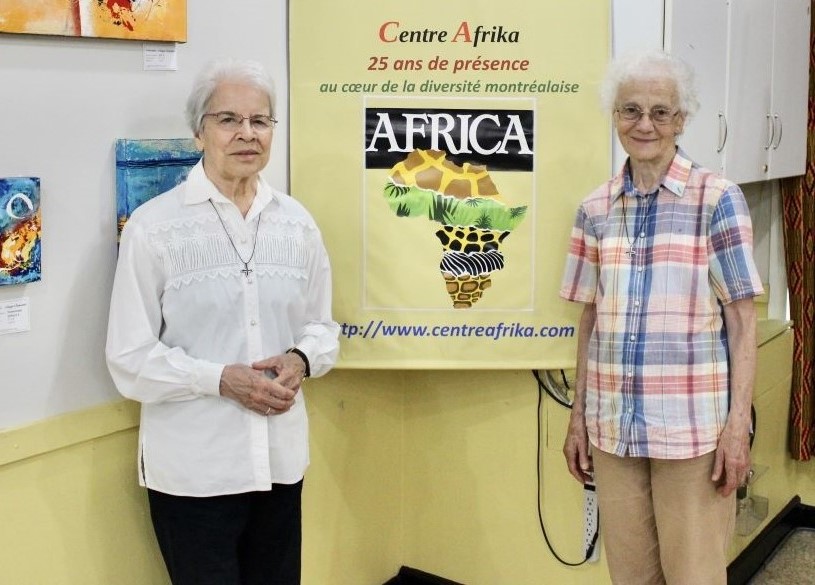
Srs. Monique Bonnefoy, left, and Rita Toutant of the Missionary Sisters of Our Lady of Africa stand near a sign that reads "25 years at the heart of Montreal's diversity" at Centre Afrika. The two ministered many years in Africa and now minister at the intercultural center in Montreal. (GSR photo/Joanna Kozakiewicz)
Editor's note: Global Sisters Report's new series, "Welcoming the Stranger," takes a closer look at women religious working with immigrants and migrants. While we cover this topic often, this series will feature sisters and organizations networking to better serve those crossing borders, global migration trends and the topic of immigration in the upcoming U.S. presidential election.
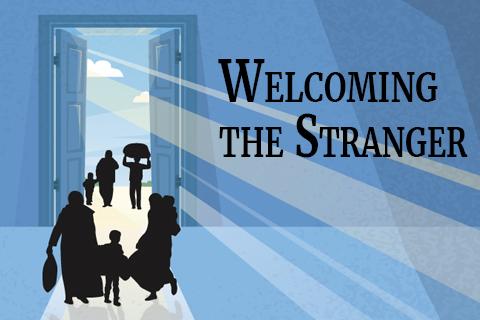
Srs. Rita Toutant and Monique Bonnefoy, members of the Missionary Sisters of Our Lady of Africa, are often referred to as the "White Sisters" under the protection of Our Lady of Africa.
After many years spent as missionaries on the African continent, Toutant and Bonnefoy are back in Canada. However, the sisters' contribution is far from over. They reside with the Missionaries of Africa, also known as the "White Fathers," in a provincial missionary home in the heart of Montreal, where they continue to serve African immigrants as well as people of other nationalities who visit Centre Afrika.
"Our first activity is to welcome people without the need for an appointment. When our pioneers started the center, it was first to welcome Africans, but the mission has progressed to welcome everyone since then," Freddy Kyombo Senga, director of the center, told Global Sisters Report. Senga is a White Father who works closely with the sisters and is responsible for animating the team at Centre Afrika.
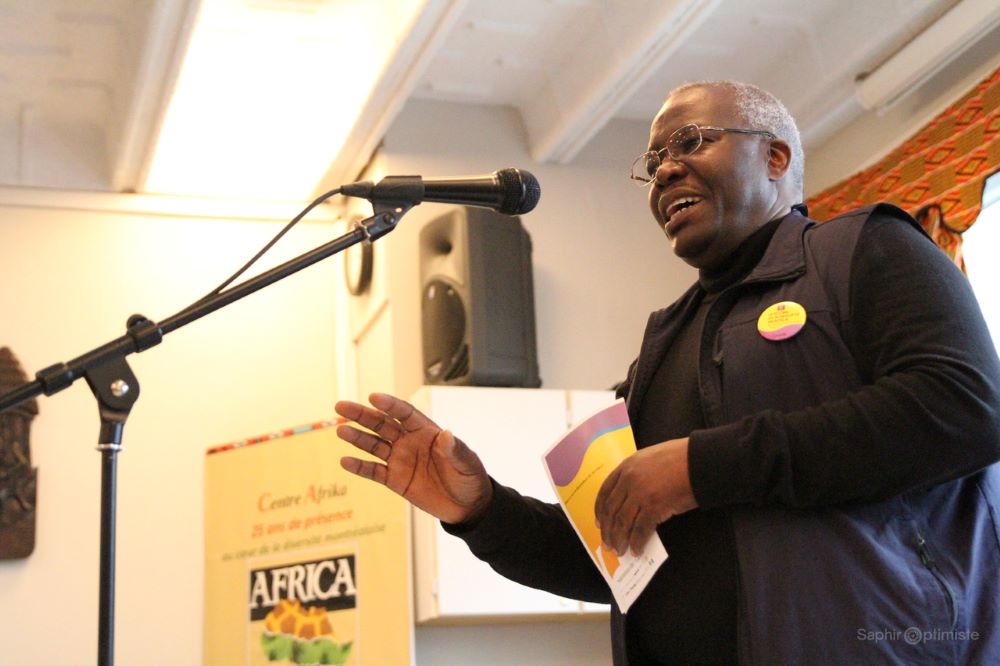
Fr. Freddy Kyombo Senga, director of the Centre Afrika in Montreal, says the Missionary Sisters of Our Lady of Africa bring complementary skills to the center, which ministers to new immigrants. (Courtesy of Centre Afrika/Saphir Optimiste)
Founded in 1869, the Missionary Sisters of Our Lady of Africa do not stay in their home countries but are sent by the congregation to an African country where they live in international communities that embody different ideas, backgrounds and cultural values.
Centre Afrika was founded in 1988 by the White Fathers as a place of "supportive hospitality." The sisters and their coworkers offer a listening ear to new immigrants and direct them to services to help them integrate into society, such as securing visas or resources for finding accommodation.
"The sisters have a specific contribution to make. First of all, they are women and secondly, they are missionaries, so they have an approach that complements what we do together. So, in that sense, it's a richness to work with the sisters for me," Senga said. "Also, when women come to ask for something, the sisters might be better equipped to talk to them and understand their needs better than us, men. So it's complementary work that's very important."
Toutant's missionary vocation was partly inspired by St. Thérèse of the Child Jesus, the patron saint of the missions. Toutant defines herself as "a citizen of the world who is inhabited by the values of openness and respect," according to her spiritual testament recorded in June 2019, for her family.
She sensed a call to the religious missionary vocation at the end of her secondary school studies. She worked in Africa for over 20 years before returning to Canada in June 2012; she joined the center in 2019. She currently volunteers at the center and at Villa Medica Readaptation Hospital, where she offers friendly visits to patients and informs them of their rights.
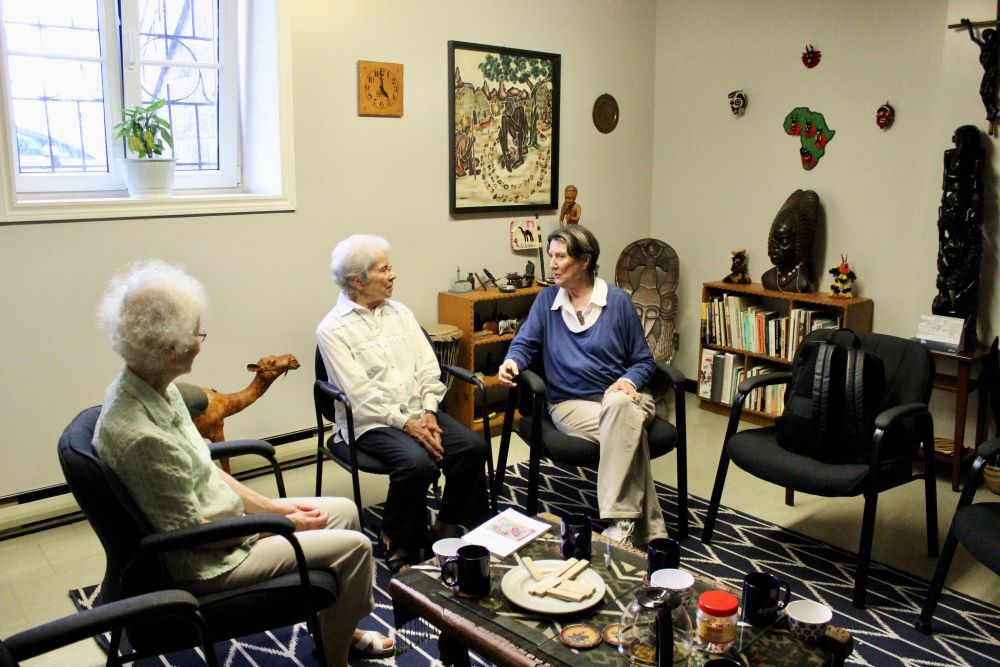
The sisters offer tea at 3:30 p.m. Tuesday to Friday to welcome people to Centre Afrika and the community and allow them to network. Here they are in a conversation with a visitor from France. (GSR photo/Joanna Kozakiewicz)
Center visitors hold a special appreciation for both sisters. Ruth Baah Donkor arrived from Ghana two and a half months ago. She met Toutant at the hospital, where they both volunteer. Toutant invited her to visit Centre Afrika "to meet her colleagues and experience the incredible work they are doing," Donkor told GSR.
"On July 12, I had the privilege of visiting Centre Afrika, and it was a day that will forever hold a special place in my heart," she said. "At Centre Afrika, I was warmly greeted by [volunteers] Monique, Freddy and David. Each of them was eager to share their knowledge, answer my questions and offer invaluable insights. Their openness and generosity made me feel like part of a close-knit family."
That day was "a source of inspiration and hope," Donkor continued. It "reignited my passion for my work and deepened my connection to this vibrant community. Thanks to the support and encouragement I received at Centre Afrika, I am thrilled to share that I have now secured a position at the airport. This new opportunity is a result of the confidence I gained during my time at the center."
Bonnefoy worked as an educator in a secondary school in Algeria, a small seminary in Ghana and a local school in Malawi. She also formed youth to enter their convent in Europe and Africa. Bonnefoy returned to Montreal in 2018 and began to work with immigrants at the Cari Center to help them learn French. In 2020, the sisters of Centre Afrika asked her to join their team.
Volunteer Karen visits the center often and enjoys its many activities, including World Africa Day. She holds a special appreciation for Bonnefoy.
"I've always regretted not having met Monique sooner, and it's amazing how close we were to each other in France and Canada. Monique is one of the most beautiful encounters of my life," said Karen, whose last name is being withheld. "She carries within her what the world needs: gentleness, kindness and clear-sightedness. I admire the 1,000 lives she has lived, her eagerness to seize every opportunity along the way and her wisdom to live in the moment.
"She sees the good in everyone, and doesn't give in to human stupidity," she continued. "She's one of the few people I listen to because I trust her discernment. In the darkest when there's nothing left to say, she stands by my side. You'll recognize her at the Centre Afrika: She's everywhere, ready to welcome the other with all her heart."
Advertisement
The intercultural center allows the sisters to reach out to immigrants who feel lost upon their arrival in Montreal and struggle to find a place that feels like home.
"Many people who arrive feel lost because they don't have a place that feels good to them." Bonnefoy told GSR. "Our first goal is to welcome everyone and to make this a place where they enjoy coming and feel welcome to talk about who they are and what they are going through."
The sisters also answer questions about where to find work, groceries and accommodation. "We give them the resources to help them find what they need," Bonnefoy said.
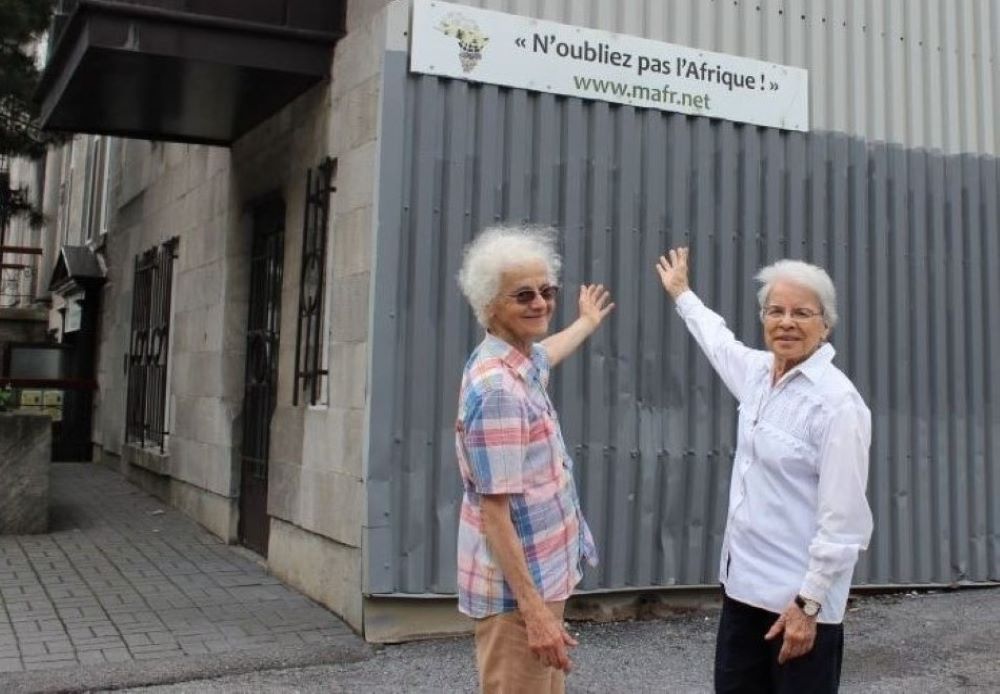
Srs. Rita Toutant, left, and Monique Bonnefoy of the Missionary Sisters of Our Lady of Africa point to a sign that reads "Do not forget Africa" on the side of the missionary home where they live in Montreal. (GSR photo/Joanna Kozakiewicz)
The congregation's vision is to foster encounters of Africans in their cultural and spiritual diversities and richness, seeking harmonious relationships among Africans, Montrealers and Quebecers.
Centre Afrika embodies this vision with statues and paintings from the continent present throughout the center. Or as the White Fathers describe it, "The Centre Afrika represents a 'home' for Africans and any person interested in the African world."
"We want people to understand that this is a house for everyone, but that there is a connection to Africa. People can get to know Africa and Africa's diversity," Senga said.
"Our priority will always be the African people and today Africa is here," added Sr. Elisabeth Villemure, a Missionary of our Lady of Africa. "You will be surprised by the number of Congolese in Montreal. There are a lot of people who come because there are wars in their countries, there are all kinds of disasters, forest fires, floods, etc. Therefore, there are a lot of Africans who come from everywhere."






